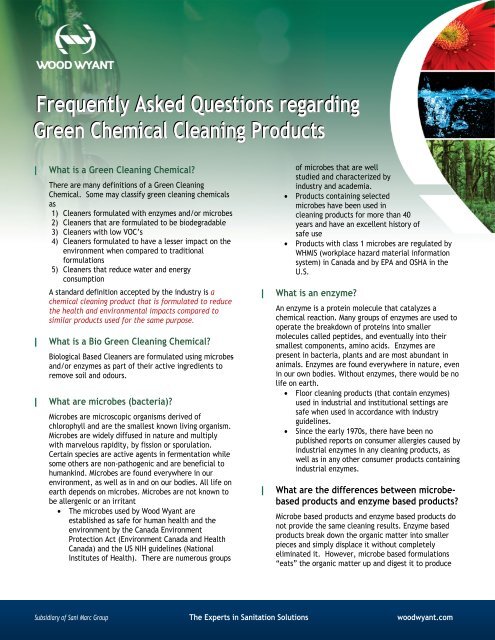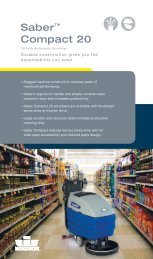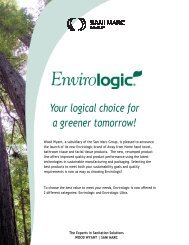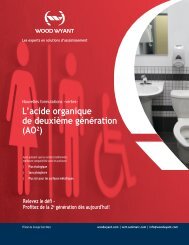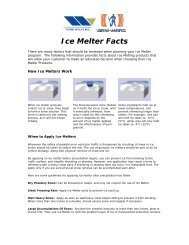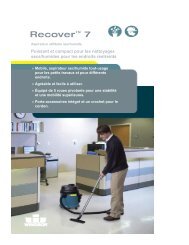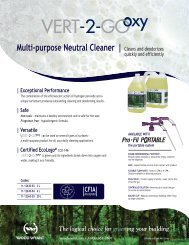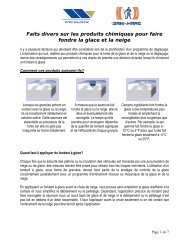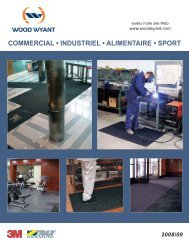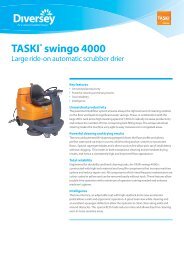FAQ Green Products - Wood Wyant
FAQ Green Products - Wood Wyant
FAQ Green Products - Wood Wyant
Create successful ePaper yourself
Turn your PDF publications into a flip-book with our unique Google optimized e-Paper software.
Frequently Asked Questions regarding<br />
<strong>Green</strong> Chemical Cleaning <strong>Products</strong><br />
| What is a <strong>Green</strong> Cleaning Chemical?<br />
There are many definitions of a <strong>Green</strong> Cleaning<br />
Chemical. Some may classify green cleaning chemicals<br />
as<br />
1) Cleaners formulated with enzymes and/or microbes<br />
2) Cleaners that are formulated to be biodegradable<br />
3) Cleaners with low VOC’s<br />
4) Cleaners formulated to have a lesser impact on the<br />
environment when compared to traditional<br />
formulations<br />
5) Cleaners that reduce water and energy<br />
consumption<br />
A standard definition accepted by the industry is a<br />
chemical cleaning product that is formulated to reduce<br />
the health and environmental impacts compared to<br />
similar products used for the same purpose.<br />
| What is a Bio <strong>Green</strong> Cleaning Chemical?<br />
Biological Based Cleaners are formulated using microbes<br />
and/or enzymes as part of their active ingredients to<br />
remove soil and odours.<br />
| What are microbes (bacteria)?<br />
Microbes are microscopic organisms derived of<br />
chlorophyll and are the smallest known living organism.<br />
Microbes are widely diffused in nature and multiply<br />
with marvelous rapidity, by fission or sporulation.<br />
Certain species are active agents in fermentation while<br />
some others are non-pathogenic and are beneficial to<br />
humankind. Microbes are found everywhere in our<br />
environment, as well as in and on our bodies. All life on<br />
earth depends on microbes. Microbes are not known to<br />
be allergenic or an irritant<br />
• The microbes used by <strong>Wood</strong> <strong>Wyant</strong> are<br />
established as safe for human health and the<br />
environment by the Canada Environment<br />
Protection Act (Environment Canada and Health<br />
Canada) and the US NIH guidelines (National<br />
Institutes of Health). There are numerous groups<br />
of microbes that are well<br />
studied and characterized by<br />
industry and academia.<br />
• <strong>Products</strong> containing selected<br />
microbes have been used in<br />
cleaning products for more than 40<br />
years and have an excellent history of<br />
safe use<br />
• <strong>Products</strong> with class 1 microbes are regulated by<br />
WHMIS (workplace hazard material information<br />
system) in Canada and by EPA and OSHA in the<br />
U.S.<br />
| What is an enzyme?<br />
An enzyme is a protein molecule that catalyzes a<br />
chemical reaction. Many groups of enzymes are used to<br />
operate the breakdown of proteins into smaller<br />
molecules called peptides, and eventually into their<br />
smallest components, amino acids. Enzymes are<br />
present in bacteria, plants and are most abundant in<br />
animals. Enzymes are found everywhere in nature, even<br />
in our own bodies. Without enzymes, there would be no<br />
life on earth.<br />
• Floor cleaning products (that contain enzymes)<br />
used in industrial and institutional settings are<br />
safe when used in accordance with industry<br />
guidelines.<br />
• Since the early 1970s, there have been no<br />
published reports on consumer allergies caused by<br />
industrial enzymes in any cleaning products, as<br />
well as in any other consumer products containing<br />
industrial enzymes.<br />
| What are the differences between microbe-<br />
based products and enzyme based products?<br />
Microbe based products and enzyme based products do<br />
not provide the same cleaning results. Enzyme based<br />
products break down the organic matter into smaller<br />
pieces and simply displace it without completely<br />
eliminated it. However, microbe based formulations<br />
“eats” the organic matter up and digest it to produce<br />
Subsidiary of Sani Marc Group The Experts in Sanitation Solutions woodwyant.com
carbon dioxide and water. In summary, microbes help<br />
to completely get rid of organic dirt while enzymes<br />
help to take it off surfaces. The kind of surfaces,<br />
environment and the nature of the organic dirt will<br />
determine which type of cleaning product (enzymebased<br />
or bacteria-based) will be used.<br />
| Are cleaning chemicals formulated with<br />
microbes and enzymes safe to use?<br />
All <strong>Wood</strong> <strong>Wyant</strong> Bio based formulations are safe for the<br />
users, the environment and surfaces. The Vert-2-Go Bio<br />
products are formulated using strains that are classified<br />
by Health Canada and the CDC (centre for Disease<br />
Control – Atlanta) as Class one – Non-Pathogens, which<br />
are naturally occurring, non-pathogenic bacteria.<br />
In addition Vert-2-Go Bio products are formulated to<br />
have a neutral pH, have no added dye, no petroleum<br />
distillates, no nonyl phenol ethoxylates (NPEs) or other<br />
harsh chemicals. Vert-2-Go products are Ecologo<br />
certified by Terra Choice.<br />
These products are regulated by Health Canada and the<br />
Material Safety Data Sheets outline the precautions<br />
necessary to use these products safely in a commercial<br />
environment.<br />
| What is Subtilisin?<br />
Subtilisin (serine endopeptidase) is a protease (a<br />
protein-digesting enzyme) initially obtained from<br />
Bacillus subtilis.<br />
Subtilisins belong to subtilases, a group of serine<br />
proteases which initiate the nucleophilic attack on the<br />
peptide (amide) bond through a serine residue at the<br />
active site. They are physically and chemically well<br />
characterized enzymes. Subtilisins are widely used in<br />
commercial products, for example in drain cleaning and<br />
maintenance products, laundry and dishwashing<br />
detergents, cosmetics, food processing, skin care<br />
ointments, contact lens cleaners, and for research<br />
purposes in synthetic organic chemistry.<br />
Subtilisin can be considered an allergen and a<br />
respiratory irritant at specifically high concentrations<br />
when it is inhaled by individuals that demonstrate<br />
sensitivity to the protease. Like plenty of conventional<br />
chemical-based cleaning solutions, a subtilisin-based<br />
cleaner may cause some respiratory discomforts<br />
aerosolized, vaporized or atomized. Unlike most<br />
chemical-based cleaning products, the enzymes<br />
solutions contain no volatiles active ingredient. This<br />
fact makes the enzymes-based product less allergenic<br />
and less irritant than most of other chemical-based<br />
products. Very few commercial cleaning products<br />
contain this enzyme. In commercial cleaning<br />
applications, this enzyme could be found in some drain<br />
cleaning and drain maintenance products and in some<br />
heavy degreasing floor cleaning formulations.<br />
<strong>Wood</strong> <strong>Wyant</strong> does not sell ANY products that contain<br />
Subtilisin where it would be recommended to use with<br />
a trigger sprayer or any other device that may<br />
aerosolize, vaporize or atomize the product.<br />
| Are <strong>Green</strong> Chemical Regulated?<br />
All commercial products must have a Material Safety<br />
Data Sheet which details the preventative measures<br />
necessary to use and handle the product safely. Users<br />
of these products must have read the MSDS and the<br />
MSDS must be readily available. As part of the<br />
regulation, all users must be trained on how to use the<br />
products effectively with the proper personal<br />
protective equipment if indicated.<br />
| What are <strong>Green</strong> Certified <strong>Products</strong>?<br />
<strong>Products</strong> can be submitted to third party organizations<br />
for certification to ensure that both consumer safety<br />
and rigorous standards are met.<br />
<strong>Wood</strong> <strong>Wyant</strong> products are certified by<br />
EcoLogo TM , North America’s largest, most<br />
respected environmental standard and<br />
certification mark. EcoLogo TM provides<br />
customers – public, corporate and consumer –<br />
with assurance that the products and services<br />
bearing the logo meet stringent standards of<br />
environmental leadership.<br />
EcoLogo TM standards are especially stringent because<br />
they address multiple environmental attributes<br />
throughout the entire life cycle of the product or<br />
service. Perhaps even more encouraging is the fact that<br />
all EcoLogo TM certified products must also meet<br />
performance requirements to ensure they perform as<br />
well as their conventional alternative.<br />
Subsidiary of Sani Marc Group The Experts in Sanitation Solutions woodwyant.com


